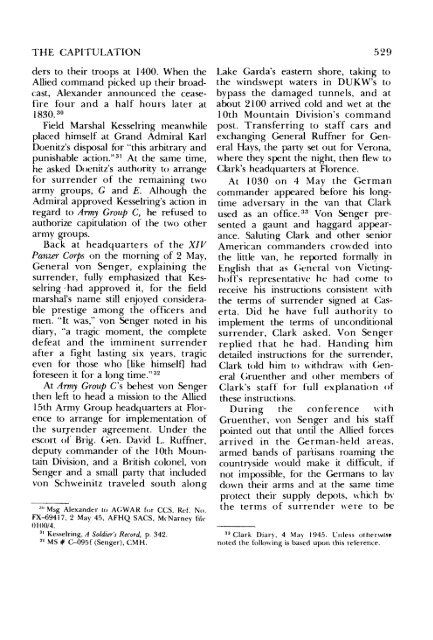Cassino to the Alps - US Army Center Of Military History
Cassino to the Alps - US Army Center Of Military History
Cassino to the Alps - US Army Center Of Military History
You also want an ePaper? Increase the reach of your titles
YUMPU automatically turns print PDFs into web optimized ePapers that Google loves.
THE CAPITULATION<br />
ders <strong>to</strong> <strong>the</strong>ir troops at 1400. When <strong>the</strong><br />
Allied command picked up <strong>the</strong>ir broadcast,<br />
Alexander announced <strong>the</strong> ceasefire<br />
four and a half hours later at<br />
1830. 30<br />
Field Marshal Kesselring meanwhile<br />
placed himself at Grand Admiral Karl<br />
Doenitz's disposal for "this arbitrary and<br />
punishable action."31 At <strong>the</strong> same time,<br />
he asked Doenitz's authority <strong>to</strong> arrange<br />
for surrender of <strong>the</strong> remaining two<br />
army groups, G and E. Alhough <strong>the</strong><br />
Admiral approved Kesselring's action in<br />
regard <strong>to</strong> <strong>Army</strong> Group C, he refused <strong>to</strong><br />
authorize capitulation of <strong>the</strong> two o<strong>the</strong>r<br />
army groups.<br />
Back at headquarters of <strong>the</strong> XIV<br />
Panzer Corps on <strong>the</strong> morning of 2 May,<br />
General von Senger, explaining <strong>the</strong><br />
surrender, fully emphasized that Kesselring<br />
'had approved it, for <strong>the</strong> field<br />
marshal's name still enjoyed considerable<br />
prestige among <strong>the</strong> officers and<br />
men. "It was," von Senger noted in his<br />
diary, "a tragic moment, <strong>the</strong> complete<br />
defeat and <strong>the</strong> imminent surrender<br />
after a fight lasting six years, tragic<br />
even for those who [like himself] had<br />
foreseen it for a long time."32<br />
At <strong>Army</strong> Group C's behest von Senger<br />
<strong>the</strong>n left <strong>to</strong> head a mission <strong>to</strong> <strong>the</strong> Allied<br />
15th <strong>Army</strong> Group headquarters at Florence<br />
<strong>to</strong> arrange for implementation of<br />
<strong>the</strong> surrender agreement. Under <strong>the</strong><br />
escort of Brig. Gen. David L Ruffner,<br />
deputy commander of <strong>the</strong> 10th Mountain<br />
Division, and a British colonel, von<br />
Senger and a small party that included<br />
von Schweinitz traveled south along<br />
:In Msg Alexander <strong>to</strong> AGW AR f(.f CCS. Ref. No.<br />
FX-694 1 7, 2 May 45. AFHQ SACS. M{Narney tile<br />
OlOOI4.<br />
31 Kesselring, A Soldier's Record, p. 342.<br />
32 MS # C-095f (Senger), CMH.<br />
529<br />
Lake Garda's eastern shore, taking <strong>to</strong><br />
<strong>the</strong> windswept waters in DUKW's <strong>to</strong><br />
bypass <strong>the</strong> damaged tunnels, and at<br />
about 2100 arrived cold and wet at <strong>the</strong><br />
10th Mountain Division's command<br />
post. Transferring <strong>to</strong> staff cars and<br />
exchanging General Ruffner for General<br />
Hays, <strong>the</strong> party set out for Verona,<br />
where <strong>the</strong>y spent <strong>the</strong> night, <strong>the</strong>n flew <strong>to</strong><br />
Clark's headquarters at Florence.<br />
At 1030 on 4 May <strong>the</strong> German<br />
commander appeared before his longtime<br />
adversary in <strong>the</strong> van that Clark<br />
used as an office. 33 Von Senger presented<br />
a gaunt and haggard appearance.<br />
Saluting Clark and o<strong>the</strong>r senior<br />
American commanders crowded in<strong>to</strong><br />
<strong>the</strong> little van, he reported formally in<br />
English that as General von Victinghoff's<br />
representative he had come <strong>to</strong><br />
receive his instructions consistent with<br />
<strong>the</strong> terms of surrender signed at Caserta,<br />
Did he have full authority <strong>to</strong><br />
implement <strong>the</strong> terms of unconditional<br />
surrender, Clark asked. Von Senger<br />
replied that he had. Handing him<br />
detailed instructions for <strong>the</strong> surrender,<br />
Clark <strong>to</strong>ld him <strong>to</strong> withdraw with General<br />
Gruen<strong>the</strong>r and o<strong>the</strong>r members of<br />
Clark's staff for full explanation of<br />
<strong>the</strong>se instructions.<br />
During <strong>the</strong> conference with<br />
Gruen<strong>the</strong>r, von Senger and his staff<br />
pointed out that until <strong>the</strong> Allied forces<br />
arrived in <strong>the</strong> German-held areas,<br />
armed bands of partisans roaming <strong>the</strong><br />
countryside would make it difficult, if<br />
not impossible, for <strong>the</strong> Germans <strong>to</strong> lav<br />
down <strong>the</strong>ir arms and at <strong>the</strong> same time<br />
protect <strong>the</strong>ir supply deIXJts, which b"<br />
<strong>the</strong> terms of surrender were <strong>to</strong> be<br />
33 Clark Diary, 4 May 1945. elliess o<strong>the</strong>nvis"<br />
noted <strong>the</strong> following is based upon this reference.
















